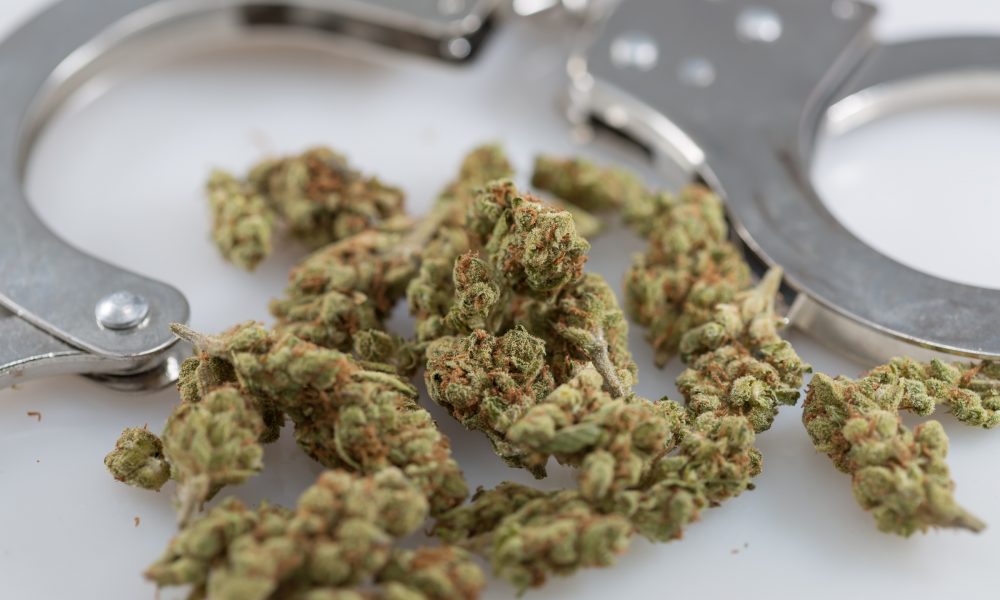Texas activists have turned in what they say are more than enough signatures to put a local marijuana decriminalization initiative on the ballot in the city of Lubbock if lawmakers there do not enact the reform legislatively.
The committee behind the initiative first filed paperwork for the Freedom Act Lubbock ordinance with the city secretary in August, and on Tuesday they submitted 10,540 signatures. Only about 4,800 of those need to be valid to formally move the cannabis decriminalization process ahead in Lubbock.
“This was a collective effort that could not have been possible without the more than 40 volunteers and the many other citizens that helped us collect these petition signatures and did the necessary work of notarizing, tallying and verifying,” Adam Hernandez, communications chair for Lubbock Compact, said at a press conference at Citizens Tower, a city government office.
“But this is only the first part,” Hernandez said. “What will happen next is up to each and every citizen of Lubbock,” he said. “We need each and every person, especially the ones who have been sitting out of elections, to get registered and make your voice heard at the ballot box.”
Last week, the campaign said that it had met its signature gathering goal but was going to continue to petition up to Tuesday’s deadline in order to ensure they garnered enough valid submissions and to “show city leaders how much support this petition has.”
The campaign Ground Game Texas—which has led the charge on several successful local decriminalization measures throughout the state and is playing an advisory role in the Lubbock effort—also recently released a report with data showing thousands of cannabis-related arrests in the city, and how Black and brown people are disproportionately impacted by that criminalization compared to white people, despite comparable rates of marijuana usage.
For example, Black people represent just eight percent of the city’s population—but they account for 29 percent of marijuana-related arrests, the report found.
The Lubbock cannabis effort is operating under a two-parted ballot initiative process. If activists got enough valid signatures, the first step is that the City Council would get a chance to take up the issue. If legislators don’t enact decriminalization, the proposal would then go on the ballot for voters to decide.
Hernandez told Marijuana Moment in August that activists “fully anticipate” lawmakers will vote against the reform given the “political climate” in the conservative town, but it’d be “great” if they enacted it in a surprise move.
Under the proposal, local police would be prohibited from making arrests or citations to adults in possession of up to four ounces of cannabis, unless there’s a binding state or federal court order against the policy. If that does happen, the initiative says the “City’s policy shall be to make enforcement of Class A and Class B misdemeanor marijuana possession its lowest enforcement priority.”
The text of the measure says that it’s meant to “promote the health, safety, and general welfare of the people of Lubbock.” Enacting the reform is in the interest of “carefully allocating scarce city resources, reducing the risk of discriminatory enforcement practices, and focusing city resources on the highest priority public safety concerns.”
Lubbock would be the second largest city by population to enact the reform. It would join cities including Austin, Delton, Elgin, Harker Heights, Killeen and San Marcos that were largely led by Ground Game Texas.
A more recent decriminalization measure that went before voters in San Antonio in May was overwhelmingly defeated, but that proposal also included provisions to prevent enforcement of abortion restrictions.
Advocates have faced issues in certain jurisdictions where voters approved decriminalization.
Shortly after voters in Harker Heights approved their measure, the city council overturned the ordinance over concerns that it conflicted with state law. But activists collected signatures for another initiative and successfully repealed the repeal in May.
The Killeen City Council temporarily paused implementation of its local voter-approved ordinance, arguing that there were legal concerns that lawmakers needed to sort through before giving it their approval, which they eventually did. But in April, Bell County filed a lawsuit challenging the policy.
At the state-level this session, the Texas House of Representatives passed a series of bills to decriminalize marijuana, facilitate expungements and allow chronic pain patients to access medical cannabis as an opioid alternative. But they ultimately stalled out in the Senate, which has been a theme for cannabis reform measures in the conservative legislature over several sessions.
The House passed similar cannabis decriminalization proposals during the past two legislative sessions, in 2021 and 2019.
Separately, a Texas Democratic senator brought the issue of marijuana legalization to the Senate floor earlier in May, seeking to attach to an unrelated resolution an amendment that would’ve allowed Texans to vote on ending prohibition at the ballot box. But the symbolic proposal was ultimately shut down. Lt. Gov. Dan Patrick (R) agreed to another member’s point of order, deeming the cannabis amendment not germane to the broader legislation.
Nearly three in four Texas voters (72 percent) support decriminalizing marijuana, according to a University of Texas/Texas Politics Project poll last year. More than half (55 percent), meanwhile, said they’re in favor of broader legalization. Seventeen percent said it shouldn’t be legal at all.
In March, the same institution similarly showed that a majority of Texas voters feel that the state’s marijuana laws should be “less strict.”
Virginia Election Next Month Could Set Stage For Legal Marijuana Sales—Or A Rollback Of Reform—Depending On Which Party Wins
Read the full article here

